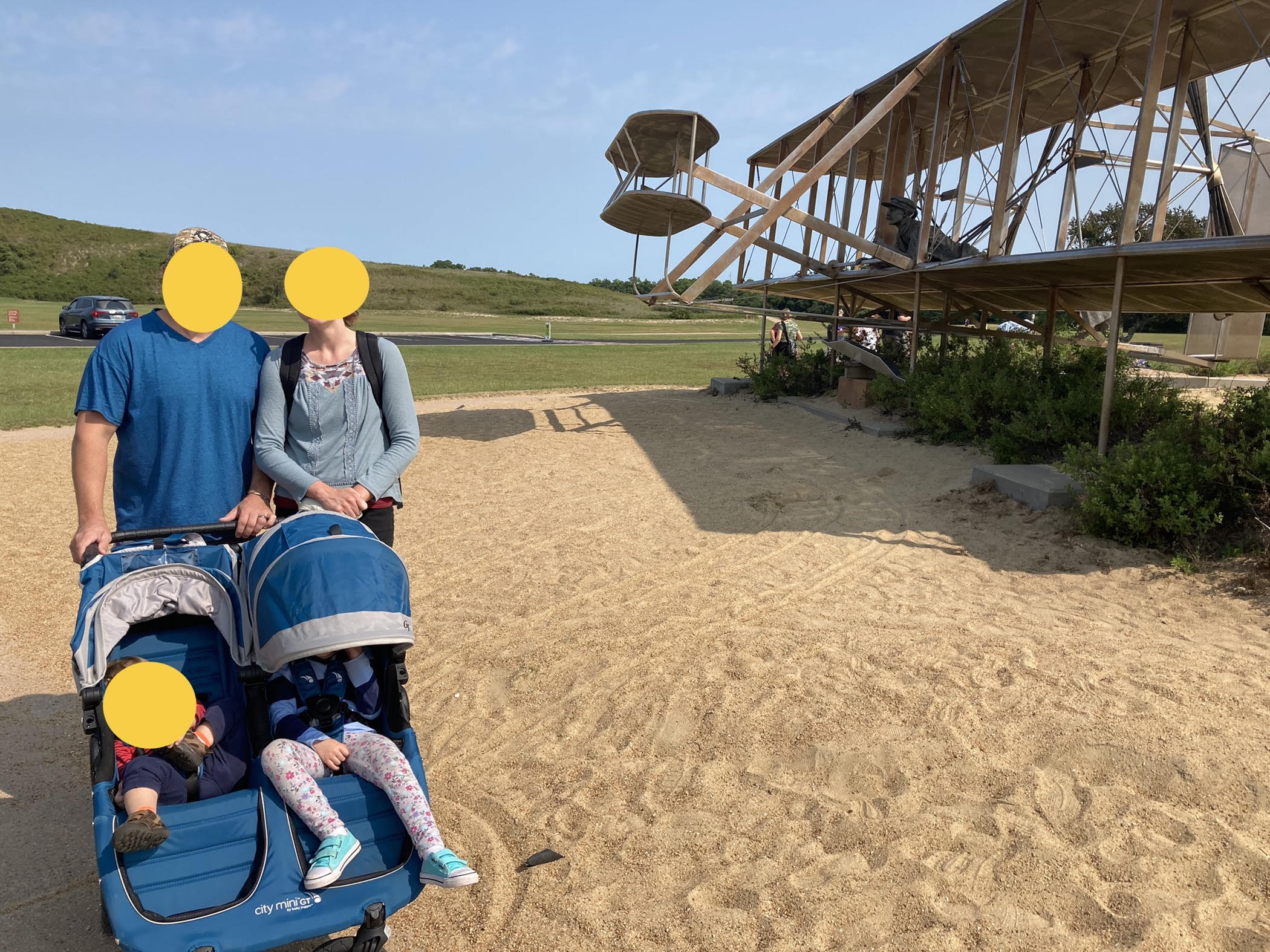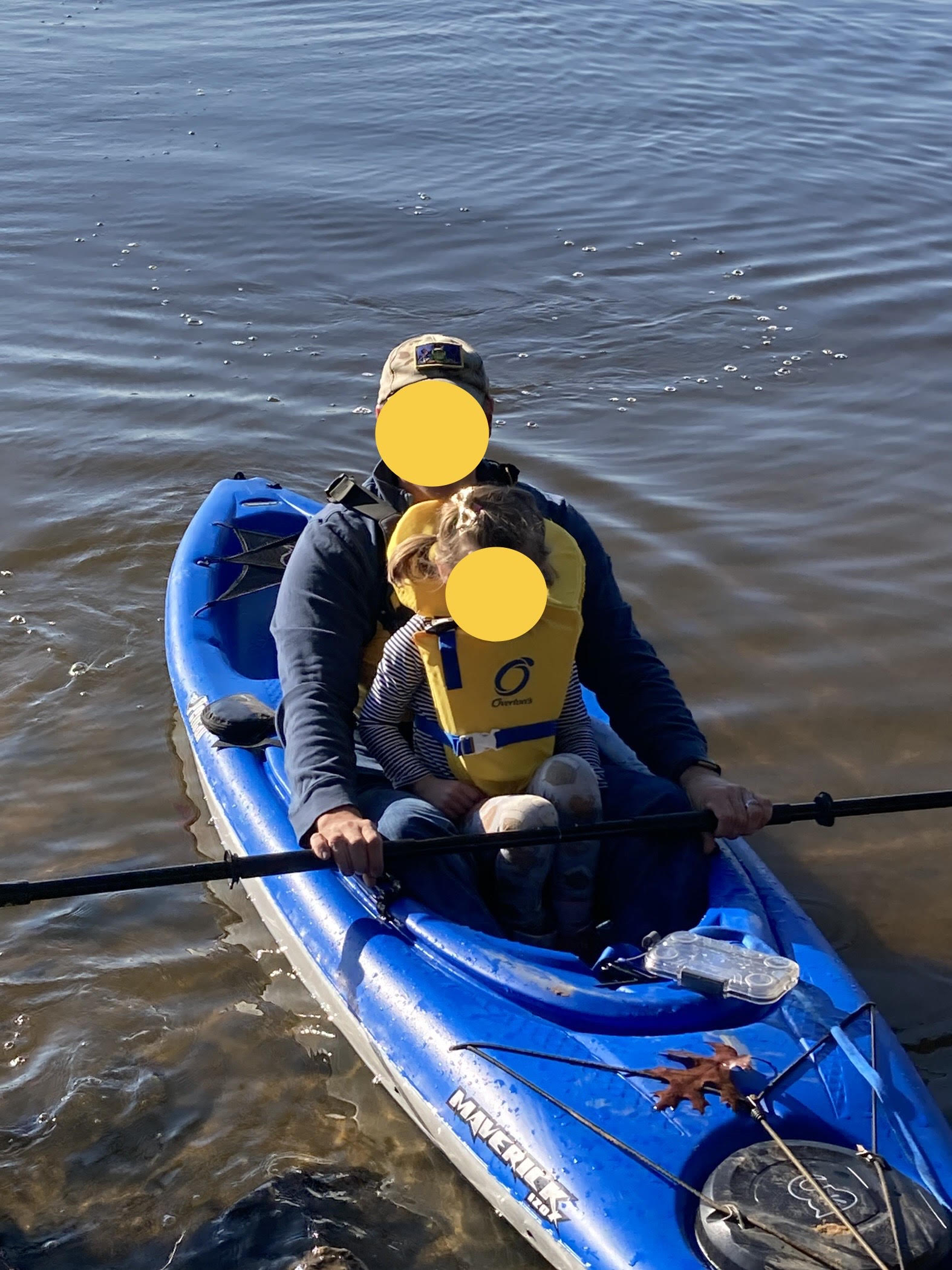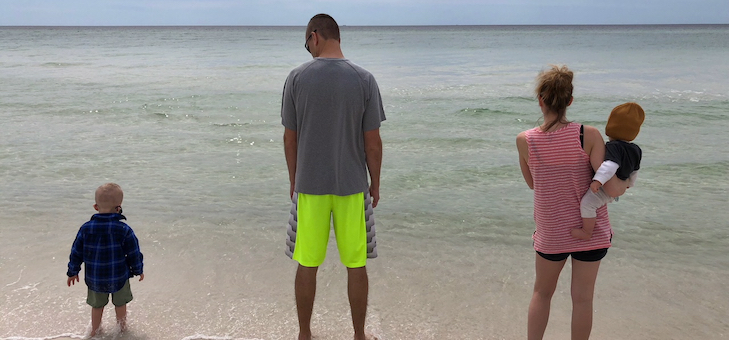
Laura and her husband Sam live in Virginia with their two young children and one dog. Sam works for the federal government in a law enforcement capacity and Laura works as a full-time stay-at-home parent. Sam is eligible for retirement (with full benefits) in nine years, but the stress of his job has the couple wondering if he can afford to switch to a lower-paying, lower-stress government position in six years. Laura also wants to find a part-time job outside the home to supplement their income. They’d like our help determining the feasibility of their plan for the next nine years.
What’s a Reader Case Study?
Case Studies address financial and life dilemmas that readers of Frugalwoods send in requesting advice. Then, we (that’d be me and YOU, dear reader) read through their situation and provide advice, encouragement, insight and feedback in the comments section.
For an example, check out the last case study. Case Studies are updated by participants (at the end of the post) several months after the Case is featured. Visit this page for links to all updated Case Studies.
Can I Be A Reader Case Study?
There are three options for folks interested in receiving a holistic Frugalwoods financial consultation:
- Apply to be an on-the-blog Case Study subject here.
- Hire me for a private financial consultation here.
- Schedule an hourlong call with me here.
To learn more about private one-on-one consultations, check this out.
Please note that space is limited for all of the above and most especially for on-the-blog Case Studies. I do my best to accommodate everyone who applies, but there are a limited number of slots available each month.
The Goal Of Reader Case Studies

Reader Case Studies highlight a diverse range of financial situations, ages, ethnicities, locations, goals, careers, incomes, family compositions and more!
The Case Study series began in 2016 and, to date, there’ve been 85 Case Studies. I’ve featured folks with annual incomes ranging from $17k to $200k+ and net worths ranging from -$300k to $2.9M+.
I’ve featured single, married, partnered, divorced, child-filled and child-free households. I’ve featured gay, straight, queer, bisexual and polyamorous people. I’ve featured women, non-binary folks and men. I’ve featured transgender and cisgender people. I’ve had cat people and dog people. I’ve featured folks from the US, Australia, Canada, England, South Africa, Spain, Finland, Germany and France. I’ve featured people with PhDs and people with high school diplomas. I’ve featured people in their early 20’s and people in their late 60’s. I’ve featured folks who live on farms and folks who live in New York City.
Reader Case Study Guidelines

I probably don’t need to say the following because you folks are the kindest, most polite commenters on the internet, but please note that Frugalwoods is a judgement-free zone where we endeavor to help one another, not condemn.
There’s no room for rudeness here. The goal is to create a supportive environment where we all acknowledge we’re human, we’re flawed, but we choose to be here together, workshopping our money and our lives with positive, proactive suggestions and ideas.
A disclaimer that I am not a trained financial professional and I encourage people not to make serious financial decisions based solely on what one person on the internet advises.
I encourage everyone to do their own research to determine the best course of action for their finances. I am not a financial advisor and I am not your financial advisor.
With that I’ll let Laura, today’s Case Study subject, take it from here!
Laura’s Story

Hi, Mrs. Frugalwoods! I’m Laura. I’m 38 years old and am married to Sam, age 41. We have two children: Sylvia (5) and Jack (3). We also have a beagle/dachshund mix, Barkley. Sam and I married in 2015. We were both working for the government at the time. We have lived in Oregon, California, and currently reside in Virginia. Sam is a federal law enforcement officer. I quit my job to be a full-time mom in 2018.
I am considering searching for a part-time job next year as I’m looking for extra income and a mental change of pace. Previously, I was a budget technician for the federal government and would love to find a federal part-time budget technician job in our town. I’m keeping my eyes open, but the positions are rare. I may try to get a bookkeeping job in the private sector. In the meantime, I’m signing up to substitute at my son’s preschool and may look into the gig economy.
If I find a part-time budget or bookkeeping job I would likely need to pay more for childcare. My son’s preschool hours are 9-12, and those aren’t normal business hours, so I would need to switch him into a day care program (part-time day care here is around $600/month, vs. the $200/month we pay for preschool). If I am substituting at his preschool or doing side-hustle gig work, I would only do those while he is in school.
Laura & Sam’s Hobbies
Before kids, Sam and I LOVED to travel. We spent our honeymoon in Patagonia and our babymoon in Iceland. We took road trips around the country, watched the sun rise from the top of Haleakala, and took an eco-tour in Ecuador. We marveled at Machu Picchu and enjoyed all-inclusive resorts in Mexico.

With kids and Covid we have not traveled internationally for the past few years. Both of our families live in other states and we spend Sam’s vacation days visiting family. We would like to travel internationally again once Sam retires and the kids are older.
These days we spend our weekends hiking and exploring the area with our family. We like to bring picnics to the park and let the kids play. I’m in a mom’s club, a book club, and work 1-2 mornings per month assisting with running races. This is fun but it only brings in $50-$100/month, which is why I’m going to start looking for a part-time job with more hours.
What feels most pressing right now? What brings you to submit a Case Study?
Sam can retire at in 9 years, at age 50, and start collecting a pension. He can also start drawing from his TSP at that point. I plugged our numbers into FireCALC and found we have a 100% chance of success at our current spending rate for the next 65 years. Great!
So now I’d like to make a more aggressive financial independence plan.
Sam would like to switch to a lower-paying job within the federal government in six years (once he reaches 20 years in law enforcement). He would work this job until he turns 50, at which point he would retire and start collecting his pension.
Here are the details of his pension:

Sam’s retirement is made up of three portions: pension, social security, and TSP. Each one is supposed to replace about a third of your working income. We estimate the pension to be around 33% of his high-three salary. We are estimating the social security portion low at this time (since there seems to be so much uncertainty about its future) at 20% of his working salary.
So we are looking at the pension replacing about 53% of his three top earning years. His high three average will be at least $105,000. We are estimating $54,965 gross pension income once he reaches 50 (not including TSP or other retirement account withdrawals). Note: He gets a social security supplement from ages 50-62, at which point he collects regular social security. The supplement is paid through his pension, but is based on his social security benefit at age 62, so we are calculating it conservatively in case that amount is reduced in the future.
We would also like to have our house paid off by the time he retires. We will probably spend the money saved from monthly mortgage payments on travel.
What’s the best part of your current lifestyle/routine?

As a full-time mom, I’m able to cook dinner every night, shop during quiet weekday mornings, and allow us to hang out as a family on the weekends without rushing around. I like the slow pace of our life. On Sam’s salary, we can cover our expenses and he is able to max out his TSP.
What’s the worst part of your current lifestyle/routine?
1) Lack of travel.
2) Being so far from our families.
-
- Sam’s family is 5 hours away by car.
- Mine is on the west coast, so we must fly out to see them.
- Once Sam retires, we will be able to move closer to family if we choose.
3) Sam’s job has a lot of stress.
Where Laura and Sam Want to be in Ten Years:
- Finances:
- Financially independent with work optional.
- Mortgage paid off.
- Lifestyle:
- Traveling more.
- Spending more time with our extended families.
- Able to spend a summer (or a whole year) abroad.
- Career:
- I would like to work a part-time “fun” job.
- Sam wants to be volunteering or also working a “fun” part-time job.
Laura & Sam’s Finances
Income
| Item | Amount | Notes |
| Sam’s Net Income | $5,321 | Sam’s net income, minus the following deductions: healthcare, taxes, TSP and FERS (pension) contributions |
| Laura’s Net Income | $100 | Laura works 1-2 mornings per month at running races and receives a stipend |
| Monthly subtotal: | $5,421 | |
| Annual total: | $65,052 |
Mortgage Details
| Item | Outstanding loan balance | Interest Rate | Loan Period and Terms | Equity | Purchase price and year |
| Mortgage | $231,700 | 2.81% | 24 year fixed-rate mortgage | 180,000 | 307k, purchased in 2019 and refinanced in 2021 |
Debts: $0
Assets
| Item | Amount | Notes | Interest/type of securities held/Stock ticker | Name of bank/brokerage | Expense Ratio |
| Sam TSP | $308,000 | Sam’s primary retirement account | 45% C fund, 25% S fund, 30% target date funds. $259,796 in traditional, $49,014 in Roth | TSP | 0.055% |
| Laura TSP | $72,833 | Laura’s primary retirement account | 65% C fund, 25% S fund, 10% target date funds. $51,345 in traditional, $21,487 in Roth | TSP | 0.055% |
| Laura Roth | $25,300 | Laura’s Roth IRA | VTSAX (total stock market index fund) | Vanguard | 0.09% |
| Sam Roth | $14,000 | Sam’s Roth IRA | S&P500 index fund | ||
| Emergency Fund | $11,000 | Emergency fund | Earns 0.30% interest | Capital One | |
| Sylvia 529 | $5,573 | Daughter’s 529 | target date fund | VA 529 | 0.371% |
| Jack 529 | $2,781 | Son’s 529 | target date fund | VA 529 | 0.371% |
| Vanguard brokerage | $1,392 | Taxable investment account | VTI (total stock market ETF) | Vanguard | 0.09% |
| Savings | $1,000 | Savings at our bank | earns .01% interest | Bank of America | |
| I-Bonds
Total: |
$500
$442,379 |
Vehicles
| Vehicle make, model, year | Valued at | Mileage | Paid off? |
| Toyota Sienna 2015 | $16,000 | 70,000 | Yes |
| Ford Explorer 2004 | $2,000 | 101,000 | Yes |
| Total: | $18,000 |
Expenses
| Item | Amount | Notes |
| Mortgage | $1,432 | Includes escrow account- homeowners insurance and property tax |
| Groceries | $1,200 | Includes household supplies, dog food, personal care, and alcoholic beverages |
| Home goods | $390 | Includes home improvement items, new dishwasher, driveway stabilization project |
| Spending money | $350 | Laura and Sam’s “fun money”, also used to buy each other gifts, our clothing and some personal items |
| Donations to charity | $250 | |
| Restaurants | $201 | |
| Gas for vehicles | $200 | |
| Kids | $200 | Preschool ($133/mo), clothes, kid medicine, baby/toddler gear, etc |
| Entertainment | $134 | Includes pool membership (use daily), summer camps |
| Electricity | $121 | |
| Car insurance | $101 | GEICO |
| Vacation/travel | $100 | |
| Car related | $95 | County tax, registration, oil changes, repairs, etc. |
| Water | $87 | |
| Internet | $79 | |
| Natural Gas | $69 | |
| Medical | $65 | included dental work, higher than other years |
| Life insurance | $58 | AIG (Laura), Prudential (Sam) |
| Gifts | $50 | |
| I bonds purchase | 50 | |
| Cell Phone | $40 | Mint Mobile, Laura and Sam each get 4 GB/month |
| Trash | $31 | |
| Subscription services | $28 | Netflix, Paramount+, Disney+, Peacock |
| Laura Roth contribution | $25 | |
| Professional association | $15 | |
| Professional liability insurance | $13 | |
| Monthly subtotal: | $5,383 | |
| Annual total: | $64,596.00 |
Credit Card Strategy
| Card Name | Rewards Type? | Bank/card company |
| Bank of America (Lauren and Sam) | Cash back | Bank of America (use for daily expenses) |
| United Gateway(SM) Card (Lauren and Sam)–affiliate link | Travel | Chase |
| IHG (Sam) | Travel | Chase |
Laura’s Questions For You:

1) Can Sam switch to a lower paying job in 6 years and still retire in 9 years?
- Sam enjoys the diversity of his duties, but the stress is starting to outweigh the job satisfaction. He originally planned to work until age 50 (which would be 23 years in law enforcement), but we’re now wondering if we can afford for him to switch jobs in 6 years and then start collecting a pension in 9.
- He would stay within the federal government and so would keep the same retirement/TSP/healthcare/all other benefits. The main change would be a major salary reduction, probably around 30%, which means his monthly net take-home would be somewhere around $3,724.70.
- What are some financial options for bridging the gap in his salary for those three years
2) Where can we cut expenses so we can save money?
- I have been underestimating the amount we spend annually.
- After completing this exercise for our Reader Case Study, I realize we’re not as frugal as I thought.
- I need some suggestions on places we can trim the budget.
- We moved from a rural part of California to a city in Virginia three years ago to be closer to amenities. With this move to civilization, we’ve been spending more on restaurants and shopping trips. I’d like to reduce our spending so we can save more.
3) Have we become house poor?
-
Sam hiking in Oregon We used to be good savers. Now, I feel like we are living paycheck to paycheck. The major things that have changed in our lives are: 1) I quit my part-time job, 2) we moved to Virginia and bought a house, 3) we added a second child (although I don’t think the second child has impacted our finances all that much).
- I’m looking for a part-time job soon. As I mentioned, our spending has increased since we moved to a town, and we will try to be more aware of that this year.
- That leaves our home. We became homeowners three years ago and I feel like it has sucked us dry. In the past 3 years we have put the following cash into our home:
- down payment (61K)
- new roof (10K)
- new HVAC (9K)
- new garage doors (3K)
- driveway stabilization project (3K)
- new dishwasher (1K)
- new refrigerator (2K).
- Last year we spent $200/month at home improvement stores on supplies for home projects.
- Our monthly mortgage payment with escrow is $1,432.
4) How do you determine if you should move to a smaller/cheaper home, or try to cut expenses at your current one?
- I think we will move closer to one of our families once Sam retires.
- We are not sure where yet though. If we move closer to Sam’s, our cost of living will decrease. If we move closer to mine, it will stay about the same.
Liz Frugalwoods’ Recommendations

I’m thrilled to have Sam and Laura as our Case Study today and I want to thank them for putting themselves out there and sharing their story with us! Laura and Sam are in good shape and I’m impressed with their forethought in mapping out Sam’s final nine working years. It’s so much easier to chart a tenable path when you have time on your side. I’m delighted to dig into this challenge today!
Laura’s Question #1: Can Sam switch to a lower paying job in 6 years and still retire in 9 years?
Let’s break it down! Laura estimates that switching jobs would reduce Sam’s income by about 30%, which means he’d have a monthly net take-home of somewhere around $3,724.70. Since this would still be a position within the federal government, his benefits would remain the same and he wouldn’t lose out on any accrual years towards his pension. This would also mean he’d continue contributing to his retirement accounts at the same rate, which makes that calculation a wash. What we need to address, then, is their cash flow.
Given that this is six years in the future, we can assume inflation will play a role here and his salary will be higher, as will their expenses. Since we can’t know what those numbers will be, we’ll use this calculation of 30% less than his current net salary as well as their current expenses. While the actual numbers will likely be different in six years, we can assume the percentages will be the same.
Their current spending is $5,383, which means they couldn’t make it on Sam’s proposed reduced salary. However, there are a number of levers we can pull to bring Laura and Sam’s expenses into alignment with this proposed new income.
Laura’s New Job

In six years, both of their children will be in school, which means no more preschool costs and, more time for Laura to work. I think much of this question will be answered by the type of job Laura secures and how many hours a week she chooses to work.
It seems entirely reasonable that she’d earn at least the $1,658.30/month needed for them to break even on their expenses [$5,383 (expenses) – $3,724.70 (Sam’s new salary) = $1,658.30]. Since this is six years in the future, we’ll assume Laura will have secured a new job by then and the couple will have a clearer picture of their combined monthly income.
The second way for them to make up this gap leads us right into…
Laura’s Question #2: Where can we cut expenses so we can save money?
I really appreciate Laura’s candid remark:
I have been underestimating the amount we spend annually. After completing this exercise for our Reader Case Study, I realize we’re not as frugal as I thought.

Same girl, same! I too used to underestimate our spending. Actually, I underestimate our spending TO THIS DAY. This is why I track my spending like a hound dog tracks a hamburger. Most of us human people have a limited/nonexistent capacity to accurately predict our monthly spending. This is why there are lots of free services and software that will track your spending for you. I use and recommend Personal Capital because it’s free and easy to use (affiliate link).
I congratulate Laura for sticking with this exercise and doing the difficult work of facing their expenses head-on. The first step is to know what you’re dealing with. The second step is to decide if you want to make changes–Laura articulated that she does–so we’re onto the third step: making a plan!
Ideas for reducing expenses
As you all know, I am not the judgy queen of how you should spend your money. I don’t care how you spend your money. I care if you are able to reach your goals in a fiscally responsible way. Given that, I view my role as identifying where people can save more money. Your job is to decide which pieces of my advice to follow as matches your priorities and preferences.
I was able to get their monthly spending down to a hair under Sam’s projected new salary ($3,724.70), but it’s tight and I had to eliminate a lot of joyful things that I know I personally would be sad to eliminate (restaurants, fun money, entertainment, etc). That being said, it is technically possible for the family to live on this amount every month and maintain their retirement contributions. However, they will have a lot more breathing room if Laura gets a job.
Here’s what I came up with:
| Item | Amount | Notes | Proposed New Amount | Liz’s Notes |
| Mortgage | $1,432 | Includes escrow account: homeowners insurance and property tax | $1,432 | This is a fixed cost that can’t be changed. |
| Groceries | $1,200 | Includes household supplies, dog food, personal care, and alcoholic beverages | $750 | I know this is tough with inflation, two kids and a dog, but this seems like the area most ripe for potential reduction. I’ll include some recommended reading below. |
| Home goods | $390 | Includes home improvement items, new dishwasher, driveway stabilization project | $0 | Can this be paused for all non-necessary expenses? I 100% agree that a dishwasher is a necessity, but if other things crop up that aren’t “mandatory,” this is an area for savings. |
| Spending money | $350 | Laura and Sam’s “fun money”, also used to buy each other gifts, our clothing and some personal items | $0 | Unfortunately, this is the easiest item to eliminate. |
| Donations to charity | $250 | $250 | I’ll leave this as is, but this is another discretionary area that could be reduced/eliminated/suspended for a time | |
| Restaurants | $201 | $0 | Sadly, this is another one ripe for the chopping block. | |
| Gas for vehicles | $200 | $200 | This is a fixed cost that can’t be changed. | |
| Kids | $200 | Preschool ($133/mo), clothes, kid medicine, baby/toddler gear, etc | $133 | Since preschool fees are the bulk of this line item, I doubt there’s a ton of room for reduction. But, if they’re not getting kids’ clothes/toys/gear used, now’s the time to start. I’ll post some recommended reading below. |
| Entertainment | $134 | Includes pool membership (use daily), summer camps | $0 | Using a pool every day sounds like this is a good bargain! If the desire is to keep this line item, they can look at other categories to reduce. |
| Electricity | $121 | $121 | Have they done an energy audit on their home? Are there any insulation/weatherization measures they could take to reduce their bill? | |
| Car insurance | $101 | GEICO | $101 | Have they shopped this around lately? It’s always work checking to see if there are better deals available. |
| Vacation/travel | $100 | $100 | Since Laura articulated that travel is one of their top priorities, I assume they don’t want to reduce this line item.
Again, if this is a priority to keep, look at other categories for reduction. |
|
| Car related | $95 | County tax, registration, oil changes, repairs, etc. | $95 | This is a fixed cost that can’t be changed. |
| Water | $87 | $87 | This is a fixed cost that can’t be changed. | |
| Internet | $79 | $79 | This is a fixed cost that can’t be changed. | |
| Natural Gas | $69 | $69 | This is a fixed cost that can’t be changed. | |
| Medical | $65 | included dental work, higher than other years | $65 | This is a fixed cost that can’t be changed. |
| Life insurance | $58 | AIG (Laura), Prudential (Sam) | $58 | This is a fixed cost that can’t be changed. |
| Gifts | $50 | $35 | This is a really reasonable amount to spend on gifts ($600 annually), but it is a discretionary line item that could be reduced if needed. | |
| I bonds purchase | $50 | $0 | Not sure this is the best use of their money right now (more on this later) | |
| Cell Phone | $40 | Mint Mobile, Laura and Sam each get 4 GB/month (affiliate link). | $40 | Great job using an MVNO!!! |
| Trash | $31 | $31 | Fixed expense | |
| Subscription services | $28 | Netflix, Paramount+, Disney+, Peacock | $0 | Could they choose just one service for a lowered bill? |
| Laura Roth contribution | $25 | $25 | Fixed expense | |
| Professional association | $15 | $15 | I take it Sam’s work doesn’t reimburse him for these costs? | |
| Professional liability insurance | $13 | $13 | ||
| Monthly subtotal: | $5,383 | Monthly subtotal: | $3,699 | |
| Annual total: | $64,596.00 | Annual total: | $44,388 |
Some inspiration for reducing groceries, eliminating restaurant meals and buying kids stuff used:
- How To Stop Eating Out According To Frugalwoods Readers
- Our Complete Guide To Frugal, Healthy Eating
- How to Thrift Like a Rockstar: Plan Ahead, Buy Ahead and Focus on Depreciation
- How To Find Anything and Everything Used: A Compendium Of Frugal Treasure Hunting
I also suggest they take my free Uber Frugal Month Challenge to help them identify other areas for savings.
Asset Overview
Setting their expenses and income aside, let’s take a look at where Laura and Sam’s money is hanging out.
Cash: $12,000

Between their two accounts, Laura and Sam have a total of $12k in cash. This is their emergency fund, which means it should cover 3 to 6 months’ worth of their spending. At their current monthly spend rate of $5,383, their emergency fund would cover just over two months for them, which means its on the slim side. Ideally, Laura and Sam should work to build this cash savings up to a full three months worth, if not more. The rationale behind an emergency fund is that it’s your “oh rats” money.
An emergency fund is there for you if you:
- Unexpectedly lose your job (layoff happen, people)
- Something horrible goes wrong with your house that needs to be fixed ASAP
- Your car breaks down and must be repaired
- You’re hit with an unexpected medical bill
- Your dog gets quilled by a porcupine and has to go to the emergency vet
As you can see, an emergency fund is not for EXPECTED expenses, such as:
- Routine maintenance on a car, such as oil changes and brake pads
- Anticipated home repairs, such as boiler servicing/chimney sweeping
- Planned medical expenses, such as LASIK eye surgery
An emergency fund’s reason for existence is to prevent you from sliding into debt should the unforeseen happen. It’s your own personal safety net. It’s also calibrated on what you spend every month, so the less you spend, the less you need to save up.
Liz’s Suggested Next Steps:
- Increase this amount to cover a full three months of expenses (at the very minimum)
- Consolidate cash accounts into one high-interest savings account, such as the American Express Personal Savings account, which–as of this writing–earns 1.90% in interest (affiliate link). This means that in one year, their $12,000 would earn $228 in interest!
Retirement: $420,133

Between their TSPs and Roth accounts, Laura and Sam have $420,133 in retirement investments. This is great and it doesn’t even account for Sam’s generous pension and anticipated social security! Laura said, “We are estimating $54,965 gross pension income once he reaches 50 (not including TSP or other retirement account withdrawals).” Based on what she shared, Sam would also receive a social security supplement from ages 50-62, after which he’ll receive regular social security.
This also doesn’t account for:
- Laura working
- Sam working a part-time “fun” job
Assuming they are not fully retired at age 50, it seems entirely possible their combined incomes could cover their spending and they could allow their retirement funds to remain invested until they do fully retire.
Since I don’t know the intricate details of Sam’s pension, he and Laura should comb through it carefully and, if possible, schedule a meeting with their HR/benefits administrator to ensure they understand it fully. It sounds like they may have already done that, but I just want to note that pensions are notoriously complex to decipher. Since it’s a pension through the federal government, I imagine there are ample educational resources available that’ll help illuminate all of the intricacies.
A few questions to ask:
- Is the pension inflation-adjusted?
- How does the pension pay out in the event of Sam’s death?
Taxable Investments: $1,392

While I commend Laura and Sam for opening a taxable investment account in a low-fee total market index fund, I don’t think this is necessarily the best use of their money right now. A taxable investment account is something you want to do AFTER you’ve fully funded your emergency fund and are easily cash flowing your monthly expenses.
Investing your money in the stock market is a long-term proposition and it’s not a place to park money you might need in the near term. There’s absolutely nothing wrong with letting this account sit there and ride, and if it were me, I wouldn’t prioritize adding more money to it right now.
Before adding more to this account, I suggest Sam and Laura:
- Build up a more robust emergency fund
- Create a monthly budget that fits within Sam’s projected new salary
- Identify Laura’s future job and salary, which’ll help tremendously with items 1 and 2
I have the exact same recommendations regarding the 529 College Savings accounts for their kids and the I-Bonds account. Focus on stabilizing the cash situation first, ensure you’re able to live within the new proposed family income, then turn your attention to these extra investment vehicles. These things are the frosting on top of a well-baked financial cake. Can’t put the frosting on a half-baked cake! Ok that’s a terrible analogy and now I want cake…
Laura’s Question #3: Have we become house poor?

I see this question as the culmination of everything we’ve discussed thus far. Laura and Sam are stretched every month to meet their regular expenses, which puts them in a somewhat precarious position. I think they will feel more secure when they identify areas for saving, determine Laura’s next job and are able to easily cover their spending each month. I suggest they hold off on all non-emergency house repairs for the time being.
Obviously stuff that’s a safety hazard must be addressed, but they don’t have the cash to pay for elective repairs/remodels at this point. Home ownership is expensive and annoying a lot of the time and it’s important to delineate between “nice to haves” and “must haves.” We could all spend all of our money on our homes if we wanted to because there’s always more to do! But it’s important to take a breath and consider whether something is a requirement or a desire. And, be assured that contractors and realtors will tell you that EVERYTHING is a safety hazard that MUST be addressed ASAP!!!!
Here’s some house stuff that’s not an emergency:
- Installing new windows because your current windows aren’t 100% energy efficient
- Patching holes and painting
- Installing new light fixtures to improve visibility
Here’s some house stuff that would constitute an emergency:
- A tree falls on your roof
- A moose bashes through your kitchen wall
- Your boiler breaks in the middle of winter

There’s obviously a balance to strike between preventative maintenance (i.e. cutting down that dead tree BEFORE it falls on your house), but I find folks often go too far in this direction. Be honest with yourself about what must be done versus what would be nice to do.
It sounds like Laura and Sam completed a lot of necessary deferred maintenance on their home:
- down payment (61K)
- new roof (10K)
- new HVAC (9K)
- new garage doors (3K)
- driveway stabilization project (3K)
- new dishwasher (1K)
- new refrigerator (2K)
Hopefully they can take a break from these expenses for awhile. These are all MAJOR repairs/appliances, so hopefully these’ll last them for awhile. I also commend them for their ability to pay for all of this without going into debt. Very, very well done!!!
Laura’s Question #4: How do you determine if you should move to a smaller/cheaper home, or try to cut expenses at your current one?
Time. Unless you’re a real estate investor/house flipper/have $$$ to burn, you can’t buy and sell houses at a rapid rate.
If you churn through houses, you’ll lose money to:
- Down payments
- Closing Costs
- Realtor Fees
- Interest Rate Changes

Laura and Sam bought their home in 2019 and have an interest rate of 2.81%, which is the LOWEST interest rate we will probably see in our lifetimes. For comparison, interest rates are currently at ~6.9%. This disparity alone forecloses the idea of Sam and Laura moving right now.
Other reasons why they shouldn’t move:
- The housing market is still red hot (although it may be cooling…. ), which makes it great for sellers/terrible for buyers
- They plan to move in nine years when Sam retires. They would very, very likely lose money if they moved now and moved again in nine years. It’s just too tight of a turnaround for them to recoup the expenses of buying and selling.
Summary:
- Identify areas to save and create a monthly budget that fits within Sam’s proposed new salary so they can feel confident in this future plan. Doing this will also allow them to…
-
Sam and Laura babymooning in Iceland Build up a fully-funded emergency fund of three to six months’ worth of their spending.
- Laura should proceed with her job search. Once she’s settled in a new position, the couple will have a clearer sense of their combined monthly income, which’ll help with items 1 and 2.
- Consider consolidating their cash into one high-interest savings account.
- Pause adding to the taxable investment, 529 and bond accounts until #1-3 are completed.
- Ensure they’re well-versed on the intricacies of Sam’s pension and ask all the questions they can think of.
- Stay in their current home and pause all non-emergency repairs/remodels.
- Enjoy life and pat themselves on the back for being in a fabulous financial position, poised to retire early!
Ok Frugalwoods nation, what advice do you have for Laura? We’ll both reply to comments, so please feel free to ask questions!
Would you like your own Case Study to appear here on Frugalwoods? Apply to be an on-the-blog Case Study subject here. Hire me for a private financial consultation here. Schedule an hourlong call with me here, refer a friend to me here, or email me with questions (liz@frugalwoods.com)










A couple of things they are missing:
1. While association dues don’t get reimbursed, his liability insurance does get reimbursed by the government. Sam needs to look up the paperwork for this
2. His pension while be effected by stepping out of a 6C category job. His year multiplier will be 1% for those years vs 1.7%. But what Sam should look into is going into management, he will increase his salary, keep his 6C status and getting out of field work is a lot less stressful.
Hi Abby, thanks for your comment!
1. Sam’s agency only reimburses 50% of the liability insurance, so the $13/month is what we end up paying out of pocket.
2. You are correct with the percentages, but actually in 6C only the first 20 years is 1.7%, after that it’s 1.1% anyway (and you still pay the higher employee contribution into FERS). I calculated the annual pension using these percentages. That’s a good point about management, his salary would definitely be higher, perhaps we can look into that as well.
If Laura was interested in doing bookkeeping for nonprofits, I see TONS of positions open on idealist.org and many remote, so she could work from home.
Hi Tracy, thanks for your comment! I will definitely look into this.
I would absolutely positively stick it out for 9 years and then retire! With the Federal government, you have a guaranteed income for life the rest of your life. I have 6 years of Federal service left, and I feel like there really is no better option than to stick it out. If you still need a bit more income then, you could get a part time job to supplement income.
There is so much to do in Virginia. It’s the greatest state. You can travel a lot just in Virginia!
All jobs are stressful! Your situation is not unique. Therefore, the best option is to figure out how to permanently eliminate that stress (e.g., retirement) should be everyone’s goal. You could achieve that in your early 50s, which is MUCH earlier than most. (The best way to do this is by FIRE-financial independence retire early) and I had such a plan long before FIRE was even talked about except the fatal flaw in my plan was the inability to find a high paying job when young. That stupid liberal arts degree was more useless than I ever expected, LOL. (You guessed it, I landed a minimum wage want fries with that job upon graduation.))
I’m wondering if you’d recommend they also save for college/future education expenses Liz. We’re in “the thick of it” now and it’s $81k a year at a private university.
Look again at Capitol One accounts. I so dislike this, but they have multiple savings accounts at different rates. Ours is 1.3% now, I think. I do have to play a game of opening a new account, but it’s super easy to do. Definitely could increase their earnings on savings.
Thanks Leah! Will do.
Echoing Leah above – it’s so silly, but I went from the Capitol One “360 savings” account at .3% to their “360 performance savings” & am now earning 2%. No fees or minimum balances on either & I was able to transfer within the app in minutes. Less than 5 minutes of effort for more free money each month.
Ditto! It’s annoying when they re-name accounts and you have to move money, but the interest rate is the best I’ve seen.
ooh, yes. I’m at 2% now too. Yay!
Wow. Guys. I just opened one and transferred our emergency fund. It was really that easy! Thanks so much for the tips!!
I am so happy I read this reply, but super annoyed with Capital One! We have 11 accounts with them. I just called and they said I have to create new accounts and move everything over, which is A ROYAL PAIN, but worth it for the interest.
A bit of a wild card suggestion: since they are very interested in spending significant time abroad, would Sam be interested in pursuing the foreign service? There are diplomatic security positions and regional security officer positions that would dovetail with his background, and he would still be eligible for retirement at 20/50 and at the 1.7% per year.
If he does switch to another job in the federal government at the end of his career, make 100% sure that it doesn’t switch his retirement system away from the 20/50 and permanent subsidized health insurance. Another idea to pursue to stave off burnout is you can take off up to 6 months each calendar year (so 12 months if you time the calendar right) with LWOP, without it affecting your retirement year credits. You can’t do it during your last 5 years though, or you lose the retirement health insurance. During the 50-62 age, he will be able to earn a certain amount (18k/year?) without it affecting the social security matching. Many people do part time or short term work back in the government (look up when actually employed status).
My husband is in the Foreign Service (Diplomatic Security)–they are almost exclusively former law enforcement or military. Living overseas is lovely and you won’t BELIEVE the savings rate you can achieve… I’m happy to chat more specifics privately 🙂
I would love to chat more!
Hi Anne, thanks for your comment! I love the foreign service and LWOP ideas, we had not considered those. And you are right, as Mrs. Frugalwoods mentioned as well, we should sit down with HR and make sure we have all of our facts completely straight before he makes any position changes.
You don’t have to join the foreign service; many federal agencies have overseas law enforcement positions, most of which cover moving fees (you could rent out your VA house) and have quite a few benefits (schools/subsidized childcare, etc) as well.
I would strongly recommend Laura look into remote bookkeeping jobs. The ROI of effort of the gig economy and subbing isn’t going to be worth it either if she wants to return full time someday (references, network) and in terms of pay. It would also be mobile when they move in 9 years
Hi Rachel, you have a great point. I agree a bookkeeping or budget job will be much better in the long run. I guess I was thinking, how can I make money quickly?! But you are right, long term a bookkeeping position would be more lucrative, and I think I would enjoy it more. Thanks for your comment!
You can also try looking at small private sector companies that only need a bookkeeper part-time. Many prefer to hire someone in-house to do payroll, invoicing, monthly financials, but don’t have enough work for full-time except for maybe tax season. You could probably find something that is largely or entirely remote. It is a tight labour market, so a great time to be looking!
I completely agree with Liz’s advice. There’s not a lot of expenses to cut, the best solution seems to be Laura getting a job, especially when the kids are both in school in 2-3 years and she could work full-time. I wonder if Sam could scale back sooner than 6 years if she does that? He sounds stressed out and 2-3 years is a lot more bearable than 6 years in a high stress job.
Ah never mind, it looks like he has to stay in law enforcement for 20 years or it affects his pension.
Yep, you hit the nail on the head. He needs 20 years in law enforcement if he wants to retire at 50. 6 years does seem like a long time. But until recently he was thinking he had 9 years left. So 6 is seeming better at this point. Thanks for your comment!
I had to google your profession. Just wondering if you would be able to prepare taxes in the upcoming tax season. There are always advertisements for that come January and Feb. you could possibly do it from home too. I also think your husband should try to stick it out for 9 more years and take leaves to assist him as much as he can or get himself promoted to a management position which hopefully would not be as much stress. I know police officers can make a lot of money policing at events like concerts, fairs, ballgames, etc. Your husband will be very young at retirement and will qualify for many jobs. Also agree with buckling down and becoming even more frugal. Good luck to you.
Hi Jean! One of the hurdles I think I will face when applying for private bookkeeping jobs is that I don’t have any finance related degrees or certificates. I learned government budget on the job, but it seems quite different than private sector budgeting. Since I’m not a CPA, I don’t think I could get tax prep jobs. Thanks so much for your comment!
Hi Laura,
I just wanted to comment as an owner of a small private consulting firm. I don’t think you need a CPA or other degree to get this type of job and it could be remote, flexible and part-time. Most of these small companies also have a CPA/tax professional for the tax side, but for bookkeeping this could include general budgeting, paying bills, invoicing clients, following up on overdue invoices, etc. This is how most of the small consulting firms / independent consultants I know operate. Hope it helps to keep the idea open for you!
You do not need a CPA for tax prep jobs. Most tax preparers are NOT CPAs. I am a CPA and my tax accountant was not a CPA for many years. 🙂 I’m not a tax accountant either.
The plan to stay 6 years and then switch jobs for the remaining 3 years seems odd. If the job is really stressful, seems like cutting expenses and switching a lot sooner would be good; otherwise why not stick it out the 9 years?
Great question. To collect his type of pension, he needs to have 20 years in law enforcement AND be 50 or older. In 6 years he will reach 20 years in law enforcement but will only be 47. He can switch to a non-law enforcement government job until he reaches 50, and then retire with full benefits. If he were to switch to a non-law enforcement job now, he would fall into the regular government retirement system and could not collect a pension until age 57. Law enforcement/firefighting/air traffic controllers have a separate retirement system as long as they do at least 20 years in one of those jobs. So at this point he is looking at working 6 more years in a higher-stress job in order to retire 7 years earlier.
1. Thank you for serving in law enforcement and being a law enforcement family. People like me who know nothing about what Sam faces in his work must always be thankful for people like him who are on the front line.
2. As you think of moving, consider the ages of your children in nine years. It is easy to fall into a “we will stay here until the kids reach–” some milestone situation, and then you never move. Or the family you move closer to will be older and maybe move or have different life circumstances. I realize this is a vague suggestion!
3. At the same time, if you are planning to probably move some day, you might not commit to your community and making friends the way you would if you were staying. Make sure that is a choice, not just something that doesn’t happen.
Thank you for your kind words! And thank you for the suggestions, you make some excellent points. There are definitely more things to consider when moving with kids. I’ve enjoyed our adventurous life so far, but sometimes I am jealous of people who are rooted in one place and don’t have to contemplate moving their kids across the country. Thanks for the comment!
I paid into a state pension (OH) AND Social Security… when I applied for Social Security, the not so friendly lady told me I was NOT allowed to double dip (from a state pension) and Social Security, so the SS keeps 2/3 of my SS, b/c of something called the windfall elimination tax… 🙁 Please double check if this will affect Sam’s retirement!
Oh wow, that doesn’t seem fair! How interesting. The previous government pension system didn’t allow for social security withdrawals, but they also didn’t pay into the system. Now, they reduced our pension from 80% to 30% and we pay into and collect SS to make up the difference (as far as I know!) I will add this to our list of things to ask an HR representative though. Thanks for the comment!
I am by no means an expert, but my father retired from the postal service and was able to have social security, a pension, and his TSP account. So … I guess one more anecdote, for what it’s worth 🙂
And as Social Security provides spousal benefits in retirement or family benefits if a parent dies, I wonder if these are also are affected by these social security limitations. Just another thing for your HR person.
Windfall elimination varies by state. I’m also in Ohio and just learned of this (public college teacher now, but was in private sector previously). Grrrrr. Hopefully Virginia doesn’t have this policy.
I’m in Ohio also and spent the bulk of my early career putting into social security only to join the county government and find out about the WEP. But I think Sam is probably okay because he’s working for the federal government and he pays into social security, something we don’t here in the state of Ohio in county jobs.
As a parent of school-age kids who works part-time, I would caution you (and anyone else considering this option) that having kids in school is not the same as having childcare! Holidays, random teacher work days, sick kids, and many half days (about 1/4 of our school days are half days) mean you’ll still need someone on kid duty a lot—and then there’s summer…but that’s a whole separate rant.
For this reason, if you want to work part time and don’t have family nearby to help (because finding reliable childcare for school-age kids is much harder than for littles), consider a remote/flexible job that will allow you to set your own hours around school schedules. This is what I do, and while it can be challenging it’s definitely easier than the alternatives.
Hi Katie, you make an excellent point. My first choice in jobs would be a part time government budget tech, but that is definitely year-round (and busiest in the summer). We may have trouble finding childcare and don’t have family nearby to rely on. As long as my husband is in law enforcement, he gets called out to emergencies at any time of the day or night. That makes it difficult for him to cover recurring childcare tasks. Flexibility in my job is something that is important to us. I want a part time job that benefits my family, not one that causes extra stress. Thanks for your comment!
Excellent points! I work two part time jobs so I can be home with my kids when they get out of school in the afternoons. I don’t make enough to cover day care in the summer so I work nights and weekends. Luckily, I found a very flexible part time job or it would not be worth it. The cost of childcare can be very expensive in the summer.
Also plan for having to change plans! I thought I would have my youngest in preschool for 12-15 hours a week and then full day kinder starting in fall 2021 but then the pandemic hit and he just started kindergarten this year! I have a total of 6 hours between drop off and pick up for the youngest per day, which really isn’t a lot.
I admire you! Great work on preparing this case study for us to share ideas and learn from. As the mom to young adults and teens, I would suggest you move closer to grandparents sooner rather than later. In nine years your kids will want to be with their peers not spending time with grammy and grandpa whom they only saw on vacations. These are the years to invest in face to face relationships. (Is that possible? All things are possible with God.)
Thank you for your kind words! And thank you for your insight. You make a great point. The reason we are planning to stay here for a bit is because Sam’s job is better for our family here than it would be many other places (his schedule, our proximity to amenities and other kids). The last two locations he worked were very rural and kid-free, and our family would not have thrived there. But we do have to weigh that against spending more time with grandparents while they are in good health and our kids want to be with them. Thanks for your comment!
Also, Sam’s pay is better here than it would be in most of the country, which in turn makes his pension amount higher.
I moved close to my grandparents around age 10, and I was very appreciative. I was old enough to really have a sense of what it was like not to live near family and was really appreciative of being near them. I loved clothes shopping with both grandma’s as a teen (they’d buy!) and had dinner with one grandma weekly. So moving when they are older is not a bad plan 🙂
As someone with vision issues that make it difficult to see in the dark, I disagree that changing your lighting to improve visibility is (always) simply a cosmetic issue. A trip and fall in the dark can cost much more than brighter lightbulbs.
Yes! I had the same thought. Updating your lighting fixtures just for the sake of giving your home a more modern look would definitely not be an emergency, but if you’re stumbling around in the dark that is definitely a safety hazard (and therefore an emergency)!
This stood out to me as well — better visibility can help eliminate trip hazards and thus is the safety issue. Also better visibility around entrances brings more security to the home from a burglary etc perspective.
I have nothing helpful to add, but I want to tell you we live with your Barkley’s doppleganger. We got our Barkley from the pound and he barked constantly so we named him Barkley. Thankfully, he seldom barks now except when in distress (like the time we closed off the dog door at 20 below and went to bed, not realizing he was inadvertently locked out. Luckily he jumped the fence and stood on our front porch barking until we finally figured out there was an annoying dog with a shrill bark in the front…then we realized it was OUR annoying barker out there!) He is even the same mix as your Barkley!
Haha, yay doppelgängers! Ours has a very loud deep bark for being so small. The other day I accidentally left him in the backyard while I walked to the bus stop and I could hear his bark echoing through our neighborhood!
Laura to Laura- thanks for doing a case study! These are super helpful for everyone and I like that we can become a hive mind! I only have tiny suggestions or thought bubbles but maybe they can help:
– love thy library. rent dvd sets for the kids and make movies a family time event instead of fancier (costlier) times. Maybe your library has kid events? Also, getting cozy with some of the cool library ladies. I swear they are the old school internet and if you wanted PT bookkeeping, ect work they may be a resource that isn’t promoted. Get cozy and drop feelers. You never know who someone knows. My library has a notary so local people mingle where they usually wouldn’t. also most have free zoo/museum/park passes too. saves a ton to go the the zoo or aquarium as a family
-Would adding another kiddo to your day be an option for making some money? Some people shudder at the idea and others roll with the munchkin chaos. just a thought
-when we were getting our emergency fund (EF) up I put a little post it on the mirror to not feel deprived. it was something like “I have everything I need today and tomorrow I’ll be more prepared” It was a reminder of the world I live in vs the thing I desire to create by spending money.
– freecycle and no buy groups are amazing. also (duh) marketplace for selling whatever you can get rid of to go toward your EF. less to clean 🙂 otherwise getting off social media the last 4/5 years has been amazing to wanting and needing less. life is less curated when not pictures or pithy lines are typed for your friends, followers, people you worked next to for 3 months 7 years ago at that one place, LOL. Social media is just death by a thousand scrolls. But seriously, you want less if you see less. That easy. And we know what we see isn’t how Becky from high school really lives her life. LOL
-i think using what we have up *first* before buying. Food, vitamin, whatever. Know what you already own. Take a pantry inventory, everything in the freezer and purge your fridge. chuck food that is lurking in the back of your pantry. unpopular opinion: don’t donate something you wouldn’t eat or feed to your family to a food pantry. as a former food bank user… no one wants your condensed split pea soup from 2019. write a list of your (easy) fav family meals that everyone eats and tweak your meals around that with adding veggies/beans/sides. I know your grocery budget was a catch all but doing the Uber Frugal Month reset is always invigorating
-make a wish list on your phone or amazon wish list. it makes you feel like you have a goal. then wait and if you are me you end up deleting what you thought you needed/wanted so badly in 3 months
-i enjoy me a fine drink. I’ve just transitioned to box wine and a handful of staple alcohols. Put me in a giant beer warehouse where I can mix and match though… I could buy my weight in fancy and new varieties to sip on! maybe a almost free date night can be a few drinks and a frozen pizza.
-walk around your house and neighborhood with new eyes. shop your own house and your own hood. I have a hard time seeing the forest through the trees when something (fun, free, I already have) is right there.
-Libby library app. i like to listen to motivational or money saving books free on the app. if that is your think you can kindle too.
– maybe suspend your financial donations until you get your EF up to where you feel comfortable. I did a future me projection of the very specific things I will donate to when I am in a better place. You should never blush at saying I’ll take care of my own family first. Even if it is only til the end of year. Until you get that savings momentum back in swing. Either way it is awesome that you guys have a giving heart.
Wow, so much good stuff here!! Thanks so much for taking the time to comment. We go to the library weekly for books but never look at kid dvd’s since I don’t know where our DVD player is, lol. But if I find it and dust it off we could start checking out movies, and cancel some of our streaming services. Brilliant. I also love your suggestion to make friends with the library ladies. And to pause on charitable donations until we have more cash reserves. Smart.
Laura, another option to find remote work is upwork.com. Good luck in your job search!
Thank you!
One option for part time employment when both of your kids are in school is to consider working in the cafeteria. The pay isn’t great, but you would likely have the same time off for holidays/in service days etc which would eliminate your need for childcare. The only downside is that you wouldn’t be working in the summer or over Winter/spring break but you would be off with your kids.
Hi Ellie, I have actually thought of this for those exact reasons! I don’t think I would love it long term, but for a few years it could bring in extra income (like what we need between years 6 and 9…) Thanks for your comment!
Lovely to hear Laura and Sam’s story, and I love the photos! The focus on having Sam retire at 50 is interesting. Based on everything you’ve said, I wonder if he should switch to a less stressful, non-law enforcement government job now and plan to retire at 57. That is still a fairly young age!
Having Sam work a lower stress job until age 57 would allow Laura to get a part-time or full-time job, either now or when the youngest child goes to school, because (hopefully) Sam’s schedule wouldn’t be as crazy and could enable more of a 50/50 parenting divide. (I am a working mom of two and fully understand the insanity around finding childcare and dealing with school closure days). Having Laura bring in more money would enable them to do a lot of things, such as save for college or pay out of cash flow, do more optional house projects, or travel!
It seems like you’re on a sprint to get through the tough job so that you can relax in 6 years, but that will require some lifestyle changes to ensure you don’t feel like you’re living paycheck to paycheck for the next 6 years. If you stretch it out a bit more, you might be a lot more comfortable. The good news is that you’ve put yourselves in a position where you can decide!
Only having $11k in an emergency fund and an older car would make me nervous. I would pull back on retirement savings for as long as it takes to build up that savings account. I would want more like $30k-$35k in an e-fund for you guys, especially since you’re a one-income, homeowner family. Then, you probably need some cash for a new car on top of that. Pulling back on retirement savings for a brief period won’t hurt you much, because you’ve done so well thus far (hurray!).
I’d make sure that your investment choices are correct given your risk tolerance and desired asset allocation. Right now you are heavily invested in stocks, but I’m not sure how the target date portion of your TSPs is invested. Also, why do you need a target date portion in addition to specific funds? Check the expense ratio of the target date fund, because you might be able to DIY it yourself for less (or, if the expense ratio isn’t bad, just move it all into a target date fund).
I’d max out both of your Roth IRA’s and then fund Sam’s TSP. I don’t know much about TSPs, so perhaps I’m missing something regarding the rules, but I feel like Roth money is more easily accessible if there were a true emergency.
Finally, do you guys have enough life insurance? You need a lot on Sam especially. Thanks again for sharing your lives with us!
Hi Michele, thanks for the different perspective! I love your suggestions. Here’s a little background on why Sam is hoping to retire at 50. He’s not at ulcer-level stress, he’s just discouraged about working almost another decade at his current job. Mentally, 6 more years is much more do-able. He’s already put in 14 years (and has paid a higher percentage into the retirement system, which he wouldn’t get back if he switched jobs now). I think he feels like he has come so far and now just has to finish the last 25% of his main career. Then we have guaranteed income and health insurance for the rest of our lives. At this point, he feels he can do 6 more years, but doesn’t wish to continue after that. Thank you so much for your comment and suggestions! Much appreciated.
Bookkeeping from home sounds like a good flexible job. As long as you do the work no one minds when it’s done, so if you have a childcare SNAFU one day/week you can do it in the eve
This might be unusual advice for a frugality blog, but I think you could lower the amount you’re putting in retirement accounts to have some more cash flow right now. I don’t see how much you’re currently saving in the TSP/FERS (and know almost nothing about these type of accounts) but assume a fairly high amount, maybe maxing? To me you guys are in a fantastic financial position, considering the pension amount and the amount that is invested in the market. If you want to look for some part-time work that’s great, but I think you can also take your foot off the gas in terms of saving in retirement and switch focus to emergency fund and having a little more breathing room. This might also have the effect of lowering just a little bit of the stress of your husband’s job to not feel like you’re living paycheck to paycheck. Let compound interest do most of the work now! You’re doing a wonderful job!
Hi Julia! Yes, Sam has been maxing out his TSP for the past… 5 years? Since we learned about FIRE. The market has also been (mostly) very good to us during that time, so that has helped our accounts grow. We will definitely keep this in mind and contemplate if this would be the right move for us. At this point I have a desire to work part time, so I will probably see if I can find a job I enjoy before we consider backing off on retirement savings. But that could be a way to lower our stress if the job hunt doesn’t work out so well. Thank you for the comment!
Seconding the suggestion to check out kid (and grownup) DVD movies, etc. from your local library. Also, since so many people have moved to streaming services, DVDs are plentiful and cheap through thrift stores. (And if you have a VCR, you can basically find VHS tapes for pennies, lol).
Also – most libraries have FREE streaming services like Kanopy etc., so that can be helpful too. Things for adults and kids and it’s FREE.
Laura & Sam – this was a great read for me, LEO spouse here & we too love to travel internationally! Pensions are great, but boy do they throw a whole extra level into planning & calculating retirement savings. So many nuances as well because no two pensions are created equal! As you journey through the next 9 years, also keep post retirement healthcare on your radar. Especially if you’re both considering a full retirement once Sam hits his required years. Not sure if that’s a perk of his job, or if you’ll need to search on the open market and pay out of pocket entirely for many years.
A thought on entertainment…my local library has Hoopla & Libby, two digital or “e-services”, not only can you check out books & magazines, but also MOVIES and TV SHOWS!!! Most phones & TVs will let you cast now, so maybe this could be something to explore if you’re considering eliminating some streaming services.
If you’ve not already considered, maybe meeting family halfway, or in a new location could be a fun way to see family & still travel domestically these next years. Get a rental house & spend a week exploring somewhere new!
Yay LEO spouses! Luckily, we will have health insurance for the rest of our lives. My calculations above include taking the survivor benefit for Sam’s pension (which will reduce the income by 10%, but we think it’s worth it). Health insurance will be included for the two of us for our lives, and for our kids until they age out (24 or 26? By then they are on their own, lol).
Thanks for the heads up on library apps. I have Libby, but I think that is just books and audio books. I will have to check into our library and see if they offer any movie/TV apps.
And, YES! We have been talking to our families about meeting somewhere for a “fun” vacation. It’s okay going to visit them for each of our vacations, but then we never get to see anywhere new. Now that our kids are better travelers we want to branch out and try AirBNB’s or maybe a cruise?! Okay I’m getting ahead of myself…… once we get our emergency fund built back up.
Thanks for your comments!
Ask HR about a retirement seminar , my husband is retired from federal law enforcement also and we were able to go to a 2 day seminar specifically for federal agents ….. super helpful and we got materials and phone numbers to call for more help later if we needed it ….. and because my husband worked a lot and traveled a lot it was hard to think of a job outside the home that would work with that lifestyle and kiddos …..I always did home daycare or subbed at preschool… no nights or weekends but still earned some extra cash ……the perks of a government pension and health insurance are great , but it is a very stressful career for sure !!!
Hi Maggie! That is an excellent suggestion, I will definitely look into it. Thanks to your husband for his service, and to you for being a LEO spouse. Thanks for your comment!
Hey there! First of all – great job! My two cents – just know that as your two children get older – they eat more and all their items (clothing/toys/everything else) goes up. Remember to budget for that 🙂 With a 15 yr old, 12 yr old, and a 9 yr old at my house it is ridiculous how much things cost! And I homeschool so I don’t have to have a huge wardrobe or the latest gadget but it still adds up! Gracious!
Good luck to you!!! It was fun to read your story!
start tracking and categorizing that spending money/fun money! I use Quicken to track and every cent gets in a category. It takes time but that $100 atm withdrawal can last a day or a month and be split 10 ways. I usually end up with $200ish at end of year that becomes misc or cash withdraw as I didn’t have receipts or skipped a week or 2 here and there of tracking. It is eye opening and then easy to make adjustments, change habits, shift budget categories. At $350/month you have $4200 not accounted for!
Hi Julie! You are 100% right. I think that has been one major blind spot for us that we need to work on. Thanks for your comment!
Another consideration – I suggest calculating when you will reach coast FI (if you haven’t already). His type of pension is incredibly powerful and often folks end up with higher income in retirement (or leave huge retirement accounts untouched) in situations like yours. It may make sense to cut back on contributions to help cash flow, especially for those last 3 years. Best wishes!
Hi Candace! This is certainly something that would be interesting to explore. I tend to error on the side of super-duper caution, and think that if we end up with extra money in retirement, it will be better than not enough. But we could look into it as an option, for sure. Thanks for the comment!
Thanks so much for sharing your story. I feel so many similarities to my own – we are feeling cash/ house poor despite having a good amount of investments and retirement savings from our pre-child days. You’ve given me the push to log in to personal capital for the first time in a while and get down to work seeing how we can rein in spending. So thanks again!
Hi Kate! Glad you found it helpful. It’s so easy to spend money without really thinking about it. Best of luck to you!
Don’t forget to include taxes and medical expenses when you calculate the monthly income you’ll need after hubby retires. And keep in mind your non-Roth investments will be subject to taxes when you begin liquidating them for living expenses at some point in the future.
Hi Lenia, thanks for the comment! You are right, those are things I (think) we have calculated, but we should update them as costs change and as Sam gets closer to retirement.
This is more a general comment for Mrs. Frugalwoods than Laura (although Laura should weigh in on her personal situation) but it bugs me that gas for vehicles is always left as a “fixed cost” and no advice or mention is made towards the potential of driving less, carpooling, taking transit, biking, thinking about becoming a one-car family, etc. If Laura is near DC/NoVa area (and other case study participants are anywhere near a mid size city) then it’s quite likely that there could be quite good options for carpooling/transit/biking that could get Sam to work, even if it’s only a few times a month. That gas adds up financially and benefits everyone in that it’s helping reduce carbon footprint/greenhouse gases/climate change.
Would just love for that option/consideration to be thrown out there a little more by Mrs. Frugalwoods since she def took advantage in the Boston area when she was able.
Great point, Ann! I will try to remember to incorporate that going forward. Thank you for reading!
Hi Ann! For us, we could cut a little bit by consolidating some shopping/outings. Unfortunately, our area has poor walkability/bikeability. Sam brings home a work vehicle, so his work provides his gas. With our kids in bulky car seats, we don’t carpool many places yet. Our biggest opportunity to reduce our gas usage will come in a few years when we replace our minivan with something more fuel efficient.
Sorry to be commenting so late…but just getting caught up on reading my favorite blogs 🙂
One thing that concerns me is your estimate for his FERS. I’m an ER nurse that has worked for the DOD and now the VA. Maybe your calculation is MUCH different but for me (who is also in FERS) it’s the average of your highest 3 years x years of service x 1%. For me it’s 1.1% because I plan on working to 62….it’s 1% for anyone retiring before age 60. So even with my estimate base salary of 110 grand with 24 years of service…my monthly pension is going to be about $2400. Even my husband who was active duty military for 22 years doesn’t have a pension near as generous as what you are estimating.
If you are correct….that’s great….but I just want you to 100% sure that you are 🙂
Also consider that they will deduct for health insurance (if you choose to keep it) and survivor’s benefit if you choose to have that, too!
Hi Jennifer! Excellent points. Here is a breakdown of our calculations for the LEO/Firefighter pension:
20 years LEO X $105,000 X 1.7% = $35,700
6 years other FERS X $105,000 X 1% = $6,300
$35,700 + $6,300 = $42,000
$42,000 – $4,200 (survivor benefit) = $37,800
This is the actual FERS pension. On top of this, Sam is eligible for a social security supplement from 50-62. I think this is the wildcard though…. if SS or FERS is reduced before he retires there’s a chance this will be reduced/eliminated. To my knowledge, when Congress changes FERS they have historically grandfathered-in current employees without changing their retirement. So let’s hope this would happen again. But for now, we will continue with the calculation as it stands now:
SS supplement calculation:
$2025 (current SS estimate at 62 from myssa.gov) X 26 years FERS / 40 = $1,316
$1316 X 12 months = 15,795 annually
$37,800 + $15,795 = $53,595 total pension
So this is actually slightly different from the previous pension I calculated. I used an updated estimate for Sam’s SS for this one. Good reminder to check this every year or two.
Good point about health insurance. Currently it is deducted from Sam’s paycheck (pretax) and we don’t even notice it’s gone. Once he retires we will have to pay it out of his pension (after-tax). We will definitely need to work that into our financial plan once he gets closer to retirement.
This is definitely our “plan A”, but we are flexible as well. I anticipate we will both work part time once he retires, which may be even more important financially if the pension ends up being less than we are currently calculating.
Thanks so much for the comments!
I’m a little late to the party, but I want to say that reading this I’m pretty happy about how solid their finances already are. The pension will cover a lot of their required expenses starting nine years from now, so the question is just how to get to that age with physical and mental health intact and with some fun and happiness along the way, too.
I’m wondering whether it could be possible to move closer to one of their extended families already – or to do that soon. Would Sam be able to transfer to a law enforcement department closer to one of the families? That could help with life happiness, childcare costs and with generally feeling supported in life.
All in all, I feel like you guys have a ton of options to make this work. Laura could work some now or she could choose to work some more when Sam’s retired and can take care of the kids more (and the kids will of course also be older then and need less care), Sam could choose to work a bit less now and accept that he may have a slightly lower pension and may have to work a bit more once “retired” (although it could also turn out that the pension is still big enough to cover all expenses). Sam could work less six years from now and take over some household chores which would allow Laura to work more. Sam and/or Laura could later on take on some very low paying hobby job that brings in for example $2k/year, because that’s $2k/year that then won’t be taken out of retirement accounts allowing them to grow more for longer.
As an example, my FIL retired from the military at age 55. He got really bored sitting at home and he drove a school bus for the next 8 years, which was (of course) a parttime job that allowed him to pay for fun summer travel with MIL, and hobbies. He also volunteered for this school, organising and assisting during outings for the kids. He loved doing this and it was a great start to his retirement.
Hi Petra! Great points. To answer your, question, it is possible for Sam to transfer closer to family now. So far though, the jobs that have come open have worse work environments than what he is in now. So we could get closer to family, but he would likely be even less happy at work. We are keeping our eyes open for good opportunities to move closer, but not holding our breath.
I love your FIL’s story, I can definitely see us doing something like that in “retirement”. I think we would be bored (and spend too much money!) just sitting at home all day at 50 and 47. Something low-stress and part time that allows us to pay for fun trips throughout the year would be perfect.
New to the site, and a bit late to comment, but here is a suggestion to reduce monthly expenses. – specifically charitable giving. Perhaps Laura can volunteer for a charitable group a few hours per month instead of donating cash. I was thinking along the bookkeeping line or something else she could do from home. That would be equivalent to a $3000 per year gig job.
Hi Lynn! That is a great idea, I have never thought of that. Thanks for the comment!
As a former Reader Case Study subject, thank you for taking the time to present your questions. It’s such a good group with wonderful, positive suggestions.
My only comment is to stay in place once your kids hit middle school. The time to relocate is when they are little. That was my experience, anyway.